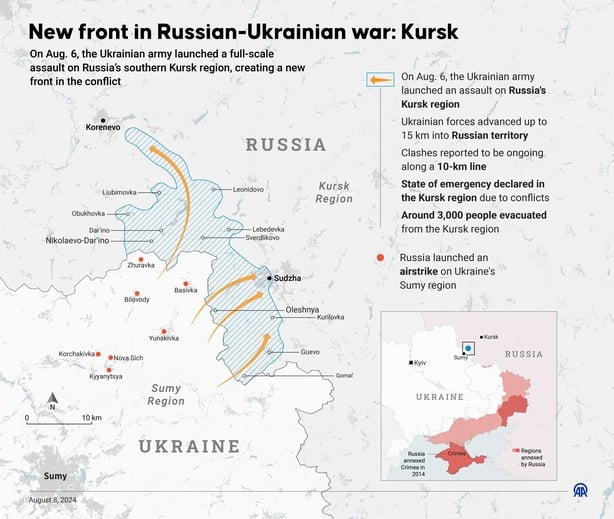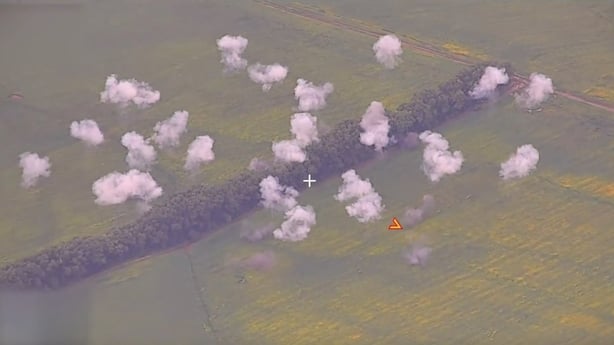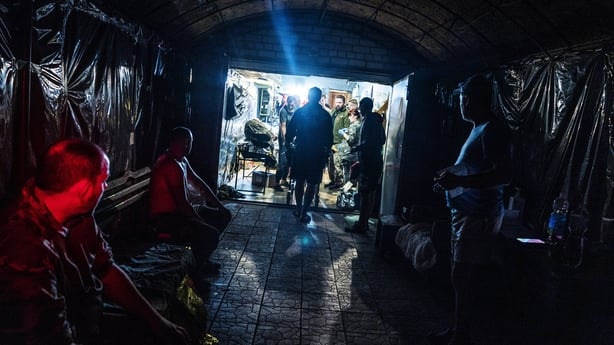Russian forces are battling Ukrainian troops for a third day after they smashed through the Russian border in the Kursk region, an audacious attack on the world's biggest nuclear power that has forced Russia to call in reserves.
In one of the biggest Ukrainian attacks on Russia of the two-year war, around 1,000 Ukrainian troops rammed through the Russian border in the early hours of Tuesday with tanks and armoured vehicles, covered in the air by swarms of drones and pounding artillery, according to Russian officials.
Heavy fighting was reported near the town of Sudzha, where Russian natural gas flows into Ukraine, raising concerns over a sudden stop to transit flows to Europe.
Ukrainian officials said the gas transit route was still functioning.

Russian President Vladimir Putin cast the Ukrainian attack as a "major provocation".
The White House said the United States - Ukraine's biggest backer - had no prior knowledge of the attack and would seek more details from Ukraine.
Russia's most senior general, chief of general staff Valery Gerasimov, told Mr Putin yesterday that the Ukrainian offensive had been halted in the border area.
Russia's defence ministry said that the army and the Federal Security Service (FSB) had halted the Ukrainian advance and were battling Ukrainian units in the Kursk region.

"Units of the Northern group of forces, together with the FSB of Russia, continue to destroy armed formations of the Armed Forces of Ukraine in the Sudzhensky and Korenevsky districts of the Kursk region, directly adjacent to the Russian-Ukrainian border," the ministry said.
The Ukrainian military has remained silent on the Kursk offensive, though President Volodymyr Zelensky praised the Ukrainian army for its ability "to surprise" and achieve results.
He did not explicitly reference Kursk.
Some Russian bloggers said Ukraine's forces were pushing towards the Kursk nuclear power station, which lies about 60km northeast of Sudzha.
Yuri Podolyaka, a popular Ukrainian-born, pro-Russian military blogger, said that there were intense battles about 30km from the Soviet-era nuclear plant, which supplies a large swathe of southern Russia with power.

The battles around Sudzha come at a crucial juncture in the conflict, the biggest land war in Europe since World War Two.
Ukraine is concerned that US support could weaken if Republican Donald Trump wins the November presidential election.
Mr Trump has said he would end the war, and both Russia and Ukraine are keen to gain the strongest possible bargaining position on the battlefield.
Ukraine wants to pin down Russian forces, which control 18% of its territory, though the strategic significance of the border offensive was not immediately clear.
Several thousand people were being evacuated from the Kursk region, according to Russian media.
Former Russian president Dmitry Medvedev said the Ukrainian attack was an attempt to force Russia to divert resources from the front and to show the West that Ukraine could still fight.
As a result of the Kursk attack, Mr Medvedev said, Russia should expand its war aims to include taking all of Ukraine.
"From this moment on, the SVO (Special Military Operation) should acquire an openly extraterritorial character," Mr Medvedev said, adding that Russian forces should go to Odesa, Kharkiv, Dnipro, Mykolayiv, Kyiv "and beyond".
"We will stop only when we consider it acceptable and profitable for ourselves."

